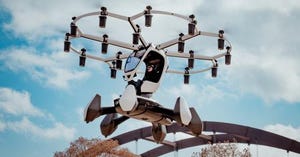A combination of technologies were added to bike lanes in New Jersey

Researchers used a combination of high- and low-tech strategies to monitor and evaluate the success of pop-up bike lanes set up around Asbury Park in New Jersey.
Technologies deployed included virtual reality (VR), lidar sensors and traffic cameras, as well as wearable sensors on riders themselves to record stress levels.
The research team sought to gain a better understanding of cyclist behavior before and after the bike lane installation and determine the best place and method of bike lane installation.
Using footage gathered via the lidar sensors, the Rutgers University team created an e-scooter simulation for users, offering further assessment of rider response to certain traffic situations.
The project was intended to improve bike network safety and comes as part of a project between Rutgers University and the city council to establish a citywide cycling network.
By setting up a temporary bike lane and assessing responses to it, the researchers hoped to cut costs associated with establishing multiple permanent cycling routes.
Results from a post-study survey showed users giving an average safety rating of eight out of 10, with 90% of respondents saying they would support making the lane permanent, though the majority also said they felt threatened by vehicles despite the separate bike lane.
The researchers concluded that virtual simulation as a user assessment method was flawed.
“Riding a scooter is difficult to simulate virtually,” the report said. “Some users had motion sickness when using the VR headsets. However, the 3D digital environment is very beneficial for modeling potential changes in the built environment.”
The team also said VR technology holds great potential as a tool for assisting urban planning in the future, though further work into fine-tuning the methodology is needed.
About the Author(s)
You May Also Like


.jpeg?width=700&auto=webp&quality=80&disable=upscale)
.png?width=700&auto=webp&quality=80&disable=upscale)



.png?width=300&auto=webp&quality=80&disable=upscale)
